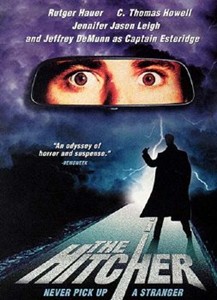 It’s not often that we read a piece as boldly contrarian as this letter to the editor from the pages of The Bellingham Herald. The correspondent comes out hard in favor of a practice that’s likely to get you arrested if you don’t take care: hitchhiking:
It’s not often that we read a piece as boldly contrarian as this letter to the editor from the pages of The Bellingham Herald. The correspondent comes out hard in favor of a practice that’s likely to get you arrested if you don’t take care: hitchhiking:
As a person who has traveled thousands of miles by the grace and generosity of strangers, I feel that I can say that hitchhiking is safe. I can’t find myself speaking poorly of any of the traveling companions I’ve met over the years, whether I was in the driver’s seat or the passenger’s. Nor have I heard a hitchhiking story, first or secondhand, that turned violent.
Conversely, picking up hitchhikers is known to provide conversation, shared driving time, great stories, delicious snacks, carpool lane privileges, and the satisfaction of knowing that you’ve personally facilitated that leg of someone else’s journey.
Unsurprisingly, the letter writers gets smacked down in comments by naysayers who insist on hitchhiking’s perils, to rider and driver alike. That argument certainly makes intuitive sense, and disturbing anecdotes can occasionally be found in police blotters nationwide. But is the threat exaggerated? Trouble is, we don’t really know for sure, since there hasn’t been any non-biased, peer-reviewed research into whether there is a significant correlation between hitchhiking and crime. A 2001 study published in the journal Sociological Research surveyed the scene, and found the evidence lacking:
We have also suggested that, at a general level, the decline is associated with a heightened perception of other people as risky, noted by Goffman (1971) as a feature of the urban social environment, and treated by subsequent social theorists as a key aspect of the consciousness of late modernity. The perception, however ‘objectively’ unjustified, has had real effects, and it is conceivable that in western societies (with the possible exception of some rural areas) hitch-hiking has entered an irretrievable downward spiral, in which hitch-hikers have become by definition marginal, deviant, possibly criminal, and certainly risky. The fewer hitch-hikers there are, the less inclined drivers will be to give them lifts, and any residual sense of obligation will become less persuasive when former hitch-hikers see those now seeking lifts as essentially different from, rather than younger versions of, themselves.
Obviously, your odds of being knifed by a hitchhiker are zero if you refuse to pick any up, a line of logic that the human mind naturally gravitates toward. We do wonder, however, how big of a role media has played in creating the perception that pure hitchhiking (that is, hitching that does not involve extraneous criminal activity such as prostitution or drug use) is guaranteed to result in major injury or death. Is it the old “Vanishing Hitchhiker” myth that began to color the practice as hopelessly dangerous? Or should we blame Rutger Hauer—which, it should be noted, is our default position when looking for a scapegoat for all minor of social ills.


Lisa // Feb 24, 2010 at 3:29 pm
“Trouble is, we don’t really know for sure”…That’s enough for me. Personal experience is a far less- biased teach than Hollywood….
No matter the time
Or the few miles crept forward
Every ride moved me.
Lisa // Feb 24, 2010 at 3:30 pm
*teacher rather.